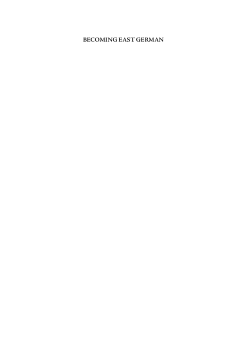
Additional Information
Book Details
Abstract
For roughly the first decade after the demise of the GDR, professional and popular interpretations of East German history concentrated primarily on forms of power and repression, as well as on dissent and resistance to communist rule. Socio-cultural approaches have increasingly shown that a single-minded emphasis on repression and coercion fails to address a number of important historical issues, including those related to the subjective experiences of those who lived under communist regimes. With that in mind, the essays in this volume explore significant physical and psychological aspects of life in the GDR, such as health and diet, leisure and dining, memories of the Nazi past, as well as identity, sports, and experiences of everyday humiliation. Situating the GDR within a broader historical context, they open up new ways of interpreting life behind the Iron Curtain – while providing a devastating critique of misleading mainstream scholarship, which continues to portray the GDR in the restrictive terms of totalitarian theory.
Mary Fulbrook, FBA, is Professor of German History at University College London. Her most recent books are A Small Town near Auschwitz: Ordinary Nazis and the Holocaust (2012) and Dissonant Lives: Generations and Violence through the German Dictatorships (2011). She is currently directing an AHRC-funded collaborative project on Reverberations of War in Germany and Europe: Communities of Experience and Identification since 1945. A former Chair of the German History Society, and Chair of the Modern History Section of the British Academy, she has written widely on the GDR.
Andrew I. Port is an Associate Professor of history at Wayne State University in Detroit, and Editor-in-Chief of Central European History. He is the recipient of a Marie Curie FCFP Senior Fellowship at the Freiburg Institute for Advanced Studies (FRIAS) and the DAAD Prize for Distinguished Scholarship in German and European Studies. His first book, Conflict and Stability in the German Democratic Republic (2007), appeared in German translation as Die Rätselhafte Stabilität der DDR (2010), and his current project looks at German reactions to genocide in other parts of the world since 1945.
“Moving beyond debates concerning totalitarianism, the 12 authors analyze the characteristics of daily life in the GDR. As a result, the subjects of the essays are sometimes surprising--dieting habits, the battle against tuberculosis, and luxury dining, for example—which only adds to the collection’s contribution to the historiography of its subject… the authors succeed in their goal of moving beyond the gray exteriors and drab lives that are often associated with life in East Germany. This alone makes the book a valuable addition to the scholarly literature.” · Choice
“This book is an excellent example of the effectiveness of an edited collection’s ability to convey a broad array of subjects that help reinforce the central theoretical premises of the work. [The] coeditors…have made excellent choices in almost all of the essays and displayed a clear vision of the major debates or historiographical controversies to which this collection could best contribute. As such, this collection is a model for future authors to follow and is highly recommended for both academic and interested general audiences alike.” · History: Reviews of New Books
“Which influences and earlier experiences determined the coming-into-being of East Germans after 1945? These are the questions addressed in this edited volume by Mary Fulbrook and Andrew Port, two researchers whose recent work has significantly inspired GDR studies... What is especially attractive is that a number of essays look at the often neglected interdependency between the two German states, their common historical roots and traditions... This not only draws attention to general developments on both sides of the Iron Curtain, but also calls into question conventional periodization.” · Sehepunkte
“Mary Fulbrook and Andrew I. Port have brought together essays on an array of topics that together serve as a very useful barometer of the state of the field of historiography on East Germany… original, incisive, and persuasive… Taken as a whole, the essays highlight historians’ growing recognition of the importance of the pre-1945 past in understanding the German Democratic Republic’s (GDR) history and their willingness to situate East German developments in a larger, comparative framework. As is so powerfully demonstrated here, analyses of East Germans’ perceptions, attitudes, and predispositions can shed much light on such fundamental issues… [T]he volume represents a substantial contribution to the scholarship on East Germany." · American Historical Review
“This is an excellent edited collection. It provides a range of methodological approaches and is right up to date: it introduces a number of new academics onto the scene while also providing some old favorites. The volume significantly adds to our understanding of East Germany and its population. It provides a reassessment of antifascism and memory... Port’s introduction and Fulbrook’s chapter on memory are masterful.” · Mark Fenemore, Manchester Metropolitan University
“By focusing less on politics in the narrower sense of the word, and more on changing discourses on the one hand and the agency of ordinary East Germans on the other, the volume provides us with exciting and innovative new sources and results as well as important questions for future research.” · Dorothee Wierling, Forschungsstelle für Zeitgeschichte, Hamburg
